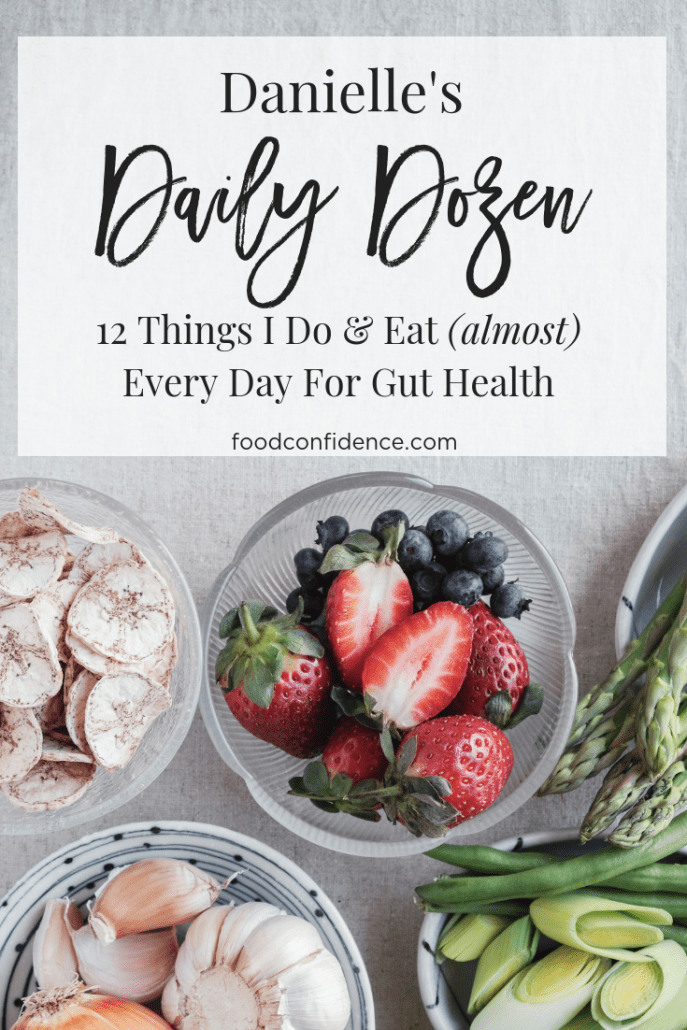
Last summer I wrote a post called The Daily Dozen: 12 Foods I Eat Everyday. It was inspired by Dr. McGreger, author of How Not to Die and it’s a list of foods I try to get in every day in order to nourish my body and enjoy my meals.
As it turns out, you loved this post! I was inspired to create another “Daily Dozen” post, and this time I partnered with Pure Encapsulations to focus on the foundational things I do (almost) everyday to support my gut health.
I know that if I focus on each of these things almost every day, I’m doing what I can for optimal gut health.
1. Fermented Foods
Fermented foods are associated with a whole host of health benefits and they can help with better digestion. The process of fermentation helps break down the nutrients in food, which ultimately makes them easier to digest.
Most of the time when a probiotic culture is separated from its original source and added to a processed food, the health benefits don’t go along with the ride. That’s why I like to go straight from the source by adding bacteria-rich fermented foods to my diet. This means eating foods like sourdough bread, tempeh, and sauerkraut.
I also add probiotic powder to the meals I’m already eating. These overnight oats are the perfect vessel for Pure Encapsulation’s Probiotic 123 powder. It’s a dairy and soy-free blend of Lactobacillus acidophilus, Bifidobacterium bifidum and Bifidobacterium lactis that helps to support the mucosal lining of the G.I. tract and promotes healthy G.I. barrier function.‡
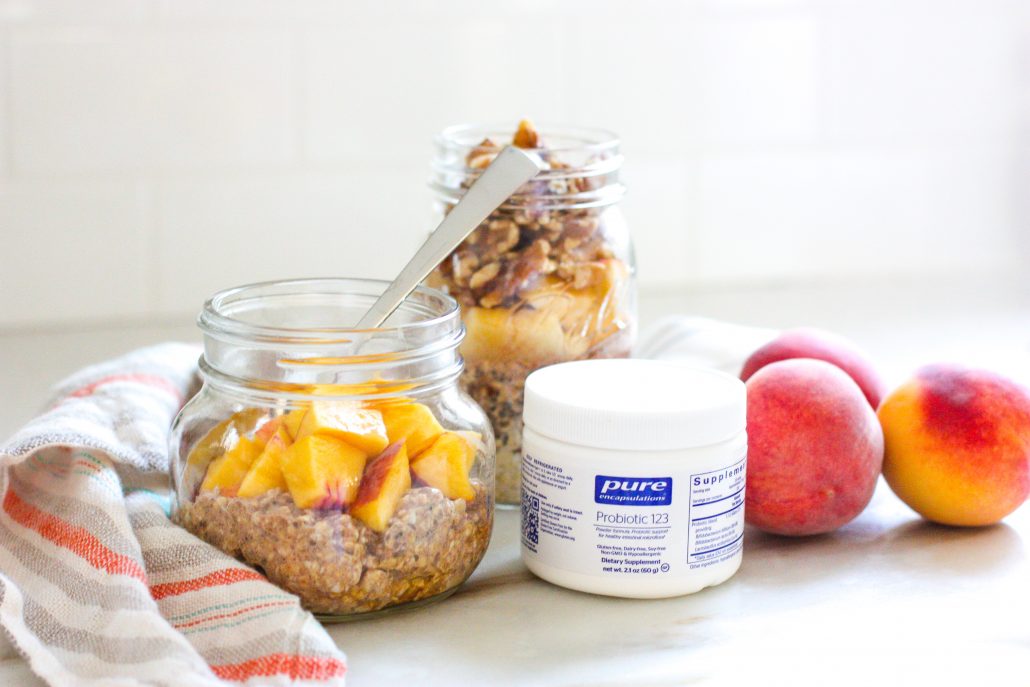
2. Prebiotics
Prebiotics are food for probiotics. They are a type of fiber that probiotics “ferment” and use for energy. Since we can’t break down this type of fiber in the gut, it’s left intact through most of the digestive tract until they reach the large intestines, where gut microflora can utilize them. Prebiotics include specific types of fiber like oligosaccharides and inulin.
Since I eat a plant-based diet, I’m already getting in prebiotics, but I also like to focus on foods that are especially good sources of prebiotic fiber. I make sure to have a serving of either bananas, asparagus, oats, cauliflower, garlic, onions, artichokes, or edamame once per day. It’s pretty easy to do!
I also add Pure Encapsulations’ PureLean® Fiber to my smoothies, soups and oatmeal! This easy-to-use powder supplement contains a blend of prebiotics and a mix of soluble and insoluble fiber. It’s super simple to add it to almost anything you’re cooking — it blends really well and has no flavor at all. I used it in this Creamy Roasted Corn Chowder recipe and nobody had a clue!
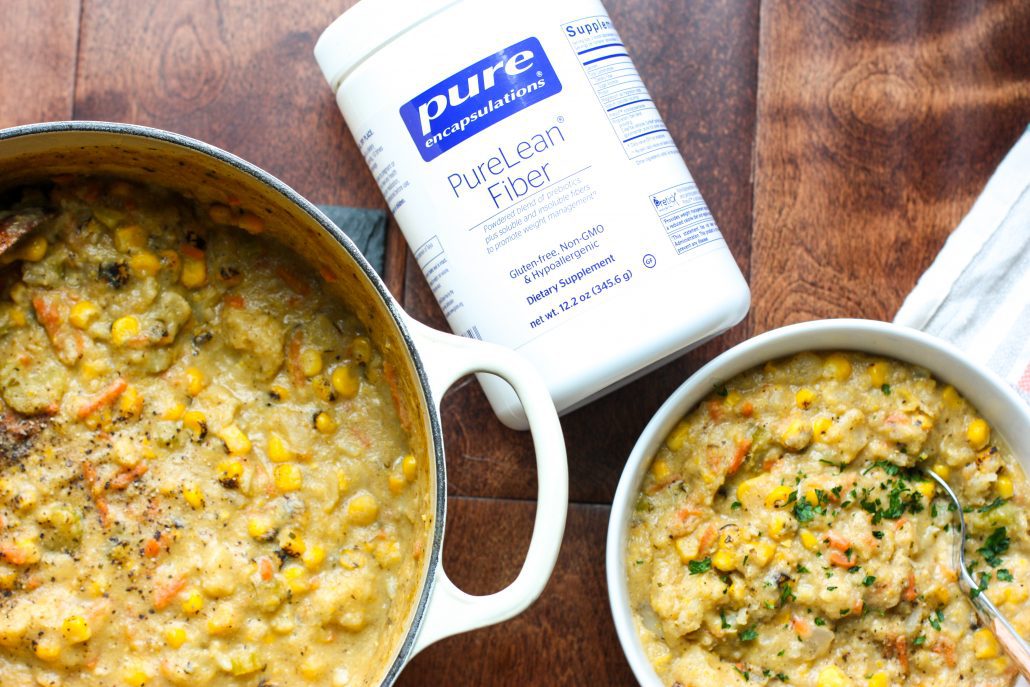
3. Eat Lots of Plants
Research shows that polyphenols (which are found in all types of plant foods like veggies, fruits, grains, tea, etc.) help support your gut microbiome. Some polyphenols are absorbed in the small intestine, while others remain intact as they travel all the way through your colon. The colon is where the microbes in your gut break them down into metabolites that offer a ton of health benefits like improved cell health and a lower risk of developing cancer.
I’ve been a plant-based eater since I was a teenager, so eating a ton of veg and fruit comes natural to me. Some of my favorite plant foods are leafy greens, cauliflower, roasted veggies, salads, and avocado! I eat a salad almost every day and all of my meals include some type of plants. This is my main strategy for improving my gut health.
4. Increase Diversity
Even though I eat a ton of plant foods, variety is just as important (if not more important) as how much I eat. By eating a variety of plant sources, I’m enhancing the diversity of microbes in my gut. Research shows that a greater diversity of microbes is one of the main signs of a healthy gut microbiome. Makes sense, right? The more types of bacteria in your gut, the more likely you are to experience health benefits. I always aim to eat the rainbow each and every day. One way of doing this is by buying 2-3 different fruits and veggies each week so I’m not eating only my favorites over and over again.
5. Ditch The Fake Sugars
Except for Stevia, I avoid artificial sweeteners. Although this area is not yet understood, some studies are suggesting that artificial sweeteners promote the growth of bacteria that encourages weight gain. Emerging research shows that our gut microbiota may not only be responsible for the changes in eating behavior, but also in the body’s hormonal responses to what we eat. Saccharin and aspartame in particular are not the best choices. They actually increase the production of bacteria directly associated with weight gain. Yikes, right? Sucralose is no better. Along with saccharin, they increase inflammation and worsen the body’s response to sugar. Since most of the studies around the effect sweeteners have on our weight and the gut have been done on animals, more data is needed to better understand how the mechanisms of hunger, satiety, gut microbiota and weight regulation are modified by the use of sweeteners.
6. Drink Up!
If you know me, you know water is not my drink of choice. But staying well hydrated is one of the simplest (and effective) ways to support gut health. For one, water keeps everything moving through the digestive tract and prevents constipation. Keeping things moving smoothly helps rid your body of toxins and metabolic waste and this keeps your gut bacteria super happy. I try to drink half my body weight in liquids each day. This includes coffee, tea, kombucha and water!
7. Chew My Food
I’ve always been a fast eater and have to really stay mindful of slowing down while I eat. Doing this is super important because taking the time to chew our food thoroughly and completely is essential for optimal digestion and absorption of nutrients. In fact, chewing is the first step in digestion! The saliva in your mouth contains enzymes that help break down your food. If you don’t chew well enough, you won’t stimulate enough digestive enzymes and this can lead to indigestion, bloating, gas and other digestive issues!
8. Stress Adaptation
When I’m stressed, I feel it in my gut. I get “nervous” stomach, lose my appetite, and skip meals. To help with this, I use adaptogenic herbs like ashwagandha and rhodiola to support my body during times of stress, and I find them to be a useful tool in my stress-management toolbox. As a supplement to daily self care, meditation, exercise, good sleep, eating healthy, exploring my creativity, and focusing on joy every day, I use adaptogens as a way to better train my body to ADAPT to daily life stressors. Pure Encapsulations’ Daily Stress Formula is my go-to!‡
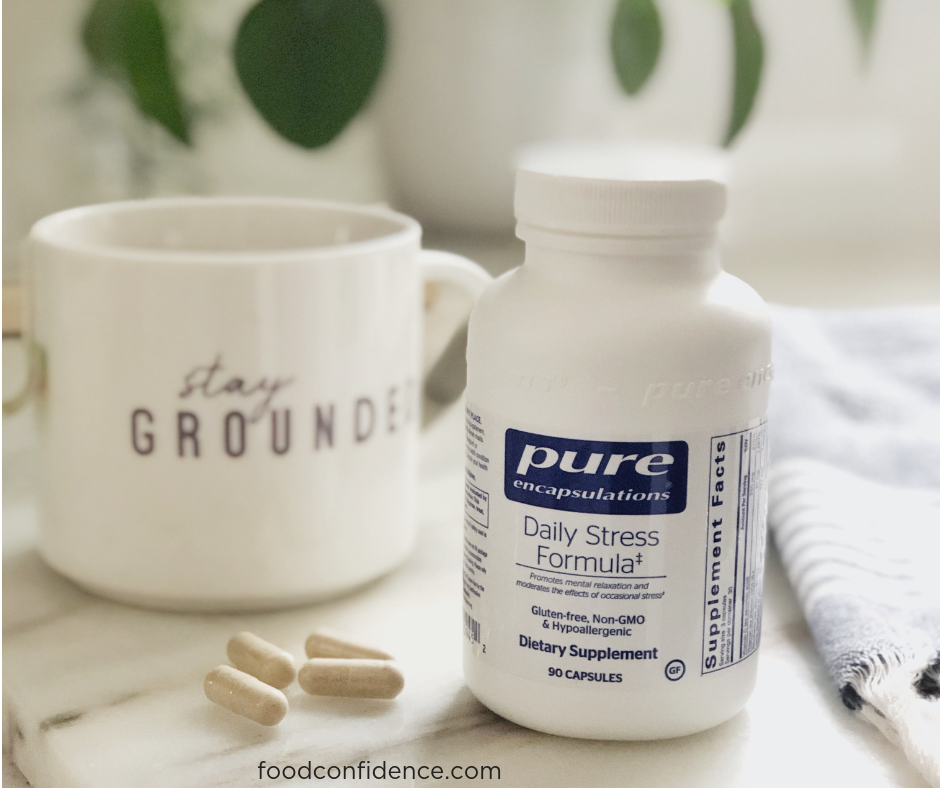
9. Discriminately Medicate
I steer clear of antibiotics and NSAIDS unless it’s completely necessary. So many of us pop Advil like it’s candy and take antibiotics for everything, but it’s often not necessary, nor is great for gut health. Yes, sometimes a round of antibiotics is what’s needed, but while wiping out the bad guys, they also wipe out the good ones. One round of antibiotics can take up to 2 years to bounce back from! NSAIDS are not much better. NSAIDS are inflammatory and reduce the population of beneficial flora like bifidobacteria and lactobacilli in the gut. Only using these medications when necessary is how I keep a healthy gut microbiome.
10. Stay Active
I make movement a priority. I strength train twice a week, do yoga, run outside and ride my bike whenever I can. What does exercise have to do with gut health? Staying active and maintaining good cardiovascular fitness is actually associated with enhanced diversity of microbes in your gut! Exercise also promotes the production of butyrate, a short chain fatty acid that supports a healthy gut lining.
11. Prioritize Sleep
Sleep isn’t a luxury for me, it’s a vital part of my healthy lifestyle and my gut health! Interestingly enough, the gut microbiome produces a number of sleep-influencing neurotransmitters like dopamine and serotonin. So if your gut is unhealthy, it’s likely that your sleep will be impacted as well. If good sleep is something you need help with, here are 5 steps you can take to get a better night’s sleep.
12. Pepper in Some Supplements
If you have gut issues you know that diet is important, but supplements can play a major role in helping give your gut what it needs to function optimally. What I love about Pure Encapsulations® is their extensive line of products, clinical protocols, and educational resources that support gut health. Their new PureGI™ Exclusive Protocol includes products supported by the latest in prebiotic, probiotic, and postbiotic microbiome science to support GI integrity, microbial balance, optimal digestion, and abdominal comfort. If you need a little extra support in any of these areas, this comprehensive supplement protocol is the way to go!‡
Want help with your own gut health? Looking to determine the best supplement plan for your unique needs? I’m happy to help!
Just get in touch here.
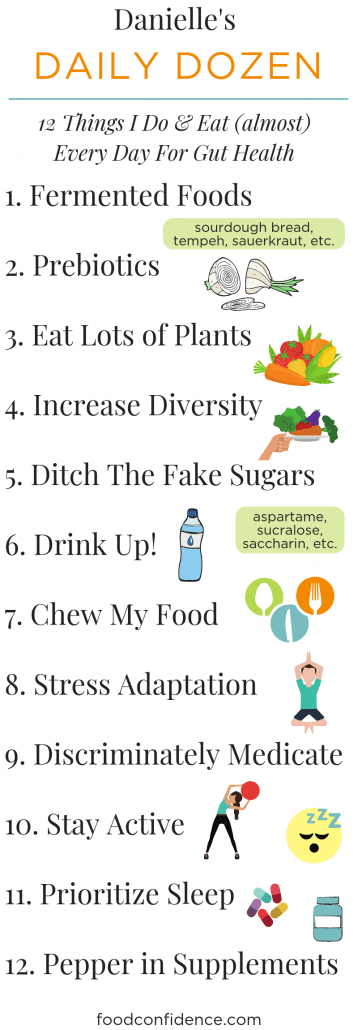
‡These statements have not been evaluated by the Food & Drug Administration. These products are not intended to diagnose, treat, cure or prevent any disease.